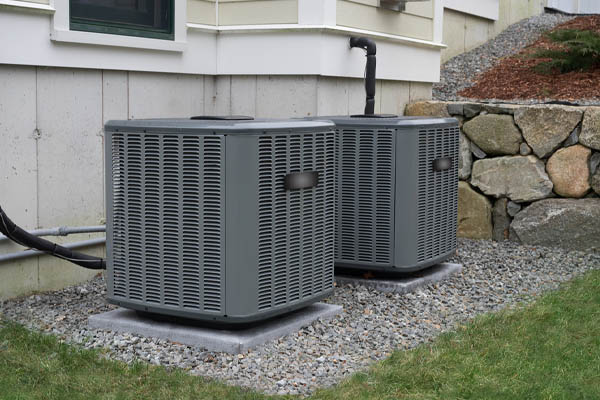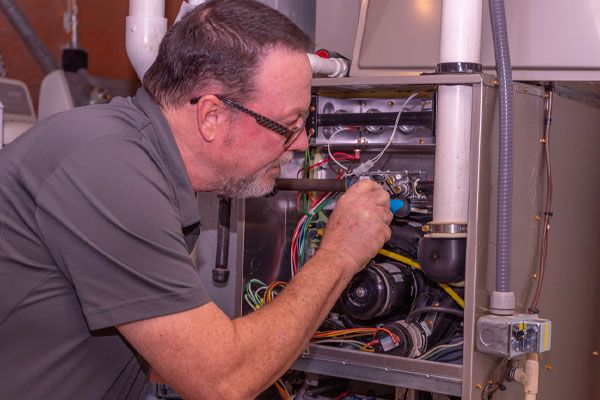The Difference Between An Air Handler Vs. A Furnace

Home comfort is critical for all homeowners, and if their HVAC system isn’t performing to their expectations, their home won’t remain comfortable. HVAC experts help homeowners find suitable HVAC replacements for cooling or heating their homes. Unfortunately, many homeowners are overwhelmed by taking on the tasks themselves. One popular question that we receive is the difference between the air handler vs furnace.
Air Handlers Vs. Furnace: What’s the Difference?
Contents
The primary difference between these types of HVAC equipment is that the furnace produces heat on its own. An air handler relies on a separate source, like a heat pump, to deliver heated air, moving the heated air through the HVAC system. The two products have similar functions and benefits as well as differences. Homeowners must review each product according to their household heating requirements.
Related Article: Do Leaky Windows Affect How My Home Is Heated?
What Is an Air Handler?

Air handlers are a part of forced air systems that require fans or blowers to circulate air from the ductwork to the registers and throughout the home. The HVAC products work in heat or cool modes to keep the property at comfortable temperatures all year.
When used in AC mode, the air handler pulls all warm or moist air from the home’s interior into the unit, and then the air blows onto the coils. Air handlers use refrigerants to extract the heat and cool down the house. The systems control humidity levels and make the home comfortable during the summer. During the process, dry, cool air is forced through ducts and registers in the living spaces.
An air handler in heat mode uses its refrigerant to extract the exterior air and pull the heat into the property. As refrigerant applies to the coils, heat releases into the interior spaces. A blower pushes cool air through the air handler and cools down the coils.
What Is a Furnace?

Furnace systems are HVAC units used to heat the home. The appliances operate on either gas, heating oil, or electricity. They are available as standalone units, or the furnaces are a part of a complete heating and cooling system.
A thermostat engages the furnace according to the temperature setting and engages the furnace according to the temperature settings. If it operates on electricity, a heat exchanger heats the air and uses a blower to circulate air after heat exchange occurs. A gas furnace uses either natural gas or propane to heat the air. The blower forces the air through the ductwork and registers after the air reaches the appropriate temperature.
The Key Difference Between Furnaces & Air Handlers
Air handlers move air around the home but do not heat the air or warm up living spaces. The products can force air through the ductwork and registers only. They contain coils that trigger similar effects to a furnace, altering the humidity levels and room temperature. Heat flowing via the coils generate from a separate installation like a heat pump.
A furnace taps into a fuel source, such as gas, or uses an electric heating element to heat the air. Select furnace models have coils, such as in central heating and air installations. Furnaces produce heat but do not produce cool air or circulate it.
How Do Air Handlers & Furnaces Work Similarly?
Both products have single or variable speeds. Air handlers and furnaces are reliable for keeping the home comfortable according to their designs and capabilities. Each product handles extreme winter temperatures well and prevents cold-related health risks for families. However, air handlers can cool down the home in mild climates where the winter months are warmer.
Air handlers and furnaces use thermostats, and a properly functioning thermostat maintains cozy temperatures all winter. Thermostats start and stop the heating or air circulation cycle.
HVAC professionals offer air handlers and furnaces in different sizes. These technicians calculate the appropriate load for the home based on its square footage and recommend the correct unit size. As a result, manufacturers produce air handlers and furnaces that meet the needs of all homeowners.
The Pros & Cons of Furnaces

The pros of using a furnace over an air handler are superior heating options that perform well in freezing temperatures and energy efficiency. In addition, homeowners have more control over the temperature in living spaces, have access to zoned heating, and have a more reliable heat source.
The cons of furnaces, especially gas-powered furnaces, start with the potential for gas leaks. Homeowners who use furnaces need carbon monoxide detectors to detect the dangerous gas in the air, and owners who don’t have these detectors must spend more money to get them. In addition, furnaces increase the use of fossil fuels and could increase environmental risks that are a significant concern these days.
The Pros & Cons of Air Handlers
The pros of air handers start with the fact that they work well with heat pumps and offer excellent heating and cooling services for the home. In addition, the products are smaller than furnaces and installed faster. As a result, homeowners don’t face any risk of carbon monoxide inhalation or related hazards.
Significant cons of air handlers include noise pollution and potential refrigerant leaks. In addition, the products cannot perform well in temperatures below 30 degrees.
Which is More Cost Effective—Air Handler or Furnace?
The cost-effectiveness of an air handler or furnace is based on how these products and connecting HVAC systems operate. An air handler works with a heat pump to perform heating and cooling functions. Homeowners can get excellent energy efficiency when using a heat pump, but these systems aren’t designed to heat homes in frigid climates. Furnaces can handle harsher temperatures without driving up heating costs.
Cost-effectiveness depends on additional factors, too. The size of the home, the climate, and the homeowner’s budget determine what is most affordable for them. HVAC technicians calculate the unit size, the cost of the unit, and the total cost of the installation. How much it costs to maintain the air handler or furnace each year defines cost-effectiveness.
Comparing these factors and then defining how well the heat pump with an air handler or the furnace heats the home shows the most suitable product for the property owner. Listing all costs and reviewing what the homeowner can pay each year to heat their home helps customers make hard choices about heating their property.
In conclusion, air handlers with a heat pump are ideal for homes in milder climates that don’t experience harsher winters. Likewise, furnaces are best for environments where temperatures drop below 30 degrees. Seek advice from an HVAC professional to compare these products further.
Call Point Bay Fuel For All Of Your HVAC Requirements

Point Bay Fuel offers superior heating and cooling services in Ocean and Monmouth County, New Jersey.
Our certified technicians can provide you with excellent HVAC services, including heating and cooling tune-ups, repairs, installations, and replacements. Each technician has outstanding knowledge and experience to serve your HVAC system needs correctly the first time around.
Point Bay Fuel guarantees to provide the most competitive heating and cooling service costs in the area. Our maintenance services ensure to improve your comfort, increase your system’s energy efficiency, and reduce your home’s heating and cooling costs.
Need your system repaired or replaced? We’ll recommend the best solution that works well within your budget. The best part is, all our work is backed with a guarantee to ensure your satisfaction.
If you wish to schedule a service appointment, give us a call today! Click here to view our service area.
Contact us now by calling (732) 349-5059 to speak to one of our home comfort specialists!
